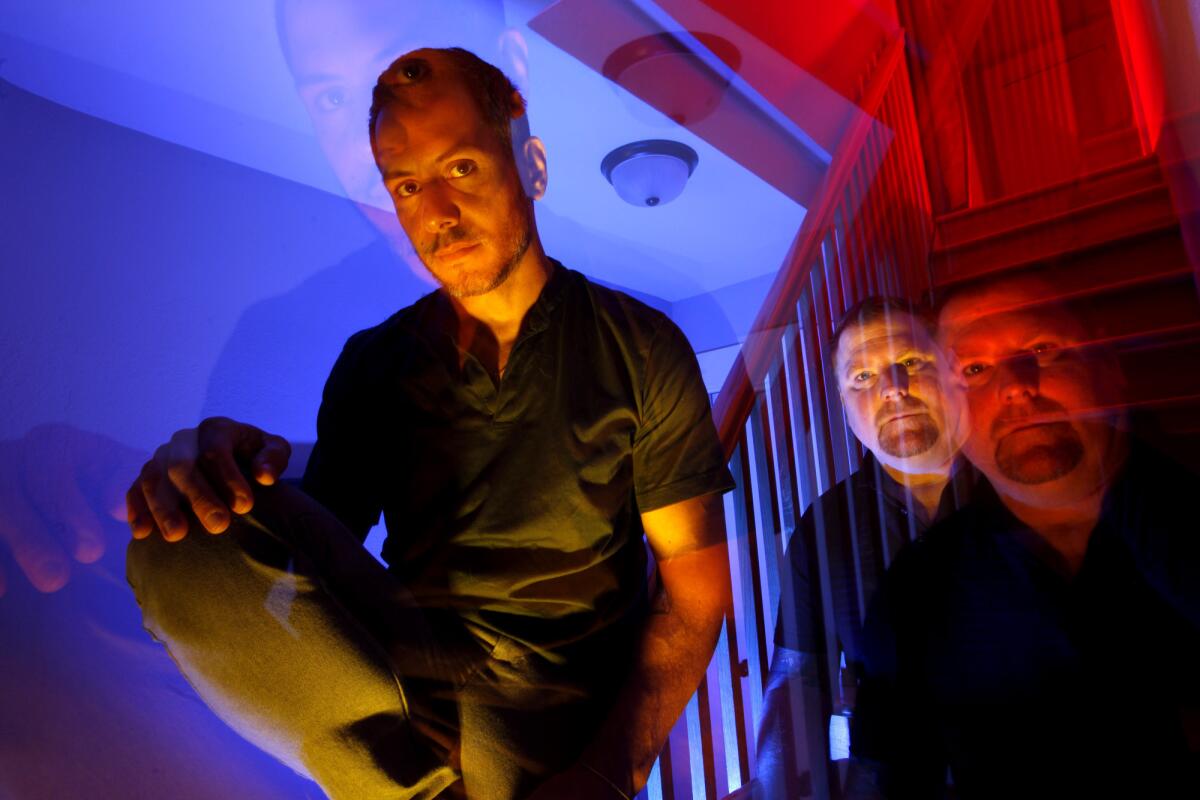Great Read: Cynic’s Paul Masvidal, Sean Reinert are out and ready to be loud

- Share via
Paul Masvidal has played in some of America’s most intense heavy metal bands for more than 20 years. Visit his Echo Park home, however, and it’s clear he’s finally found peace.
The 43-year-old singer-guitarist, sinewy and gently graying at the temples, lives in a royal-blue Craftsman with a wide view of Echo Park Lake. The bookcases are stacked with thick references on esoteric spirituality. Photos on the fridge show sweet, fading scenes from an old relationship; a tuckered-out Australian cattle-dog mix plonks itself at his feet.
His closets overflow with boxes of vinyl LPs of the new album by his band, Cynic, released in February to metal-scene acclaim. In the early ‘90s, the group he co-founded with drummer Sean Reinert mixed ferocious distortion with jazz-inspired musicianship that helped establish the genre of progressive metal. Two decades later, they’re one of metal’s coolest influences.
Most musicians would murder for a resume like that. But there’s one thing that Masvidal and Reinert have stayed quiet about in their public lives, until now.
Both men are gay and stars in a music scene where bands can wear corpse-paint makeup and leather S&M garb while singing about Satan and dismemberment — yet genuinely nonconforming sexuality hasn’t always been welcome.
Though they’ve been comfortably out for years in their private lives, the two haven’t yet spoken about their sexuality in the context of their music.
As artists, they’ve pushed the edges of heavy metal music for most of their lives. Now they’re ready to challenge old stereotypes about sexuality in one of music’s most aggressively masculine genres.
“I see all those old dudes out there just banging their heads to our records,” Reinert said, wearing an imposing goatee and extra-large Miami Dolphins jersey. “And I have to think — ‘That stuff you’re banging your head to? That is some gay, gay metal, man.’”
::
Masvidal and Reinert have played music together since meeting in middle school in Miami.
Even before they came out, they were outsiders in a city known for rowdy Latin and dance music. The barrel-torsoed Reinert was a music-theory nerd; Masvidal’s Cuban American parents went through three marriages apiece by the time he was 10.
“My parents put me in therapy at 5. They did all these Rorschach tests, and I decided to have fun with it,” Masvidal said. “Like, ‘Oh, that’s a giant bloodstain, and that’s Satan’s head.’ That quickly got my parents to pay attention.”
They channeled that disaffection into their instruments, becoming some of the most technically ambitious musicians in the Florida metal scene.
Their early tours and recordings as members of Death, which pioneered the harsh “death metal” sound, brought them into the elite heavy-metal underground. Cynic’s 1993 debut album “Focus” (with bassist Sean Malone, who records with the group), became a genre landmark. Its mix of time-shifting rhythms and jazz-inspired chord changes was unlike anything metal fans had heard before.
Masvidal had come out to friends and family in 1991, and later began exploring drag bars and gay nightclubs while on tour. Reinert a bit took longer to come out. (And, they stress, they’ve never been attracted to each other.)
“I knew that, secretly, I wanted to go to those clubs too,” Reinert, 42, said. “But back then, my stereotype of how to be gay was wearing dresses and tank tops. I didn’t have any masculine, metal role models who were gay.”
Metal’s first openly gay star, Rob Halford of Judas Priest, didn’t come out until 1998. Gay extreme-metal peers, like Gorgoroth’s frontman Gaahl, were vanishingly few (and not exactly role models — Gaahl once went to prison for torturing a man and collecting his blood).
On Cynic’s first big national tour in the early ‘90s, opening for the superstar death metal band Cannibal Corpse, the pair sometimes worried they’d get thrown offstage — or worse. Even if they weren’t publicly out, they still challenged audiences with an anti-macho stage presence.
“That tour was really traumatic for us,” Masvidal said, recalling anti-gay epithets being yelled at them. “We were wearing Indian garb and we had a girl keyboardist, and we were playing to this Paleolithic crowd throwing bottles and yelling ‘Get off the stage...’ It was our first big tour and all we could think was, ‘We don’t belong here.’”
In the mid-’90s, mainstream America was still wrestling with how LGBTs fit into society. The heavy metal world wasn’t even close to having that conversation.
“I think it’s true, when you become successful in the music world, you probably go more in the closet,” Halford said in his 1998 coming-out interview with the Advocate. “You get under the rug in the closet because of the phobia that still exists in rock music. You could lose a record deal, a fan base. It’s really difficult for any musician to come out.”
Neither Masvidal nor Reinert was ready to include his sexuality as a part of the band’s identity. After those rough early tours, Cynic started winding down in 1994, having kept their sexuality quiet from their fans for their whole career.
::
The two eventually moved to L.A. and pursued other projects, together and apart. They started bands like the dreamy and pop-inclined Aeon Spoke, and played alongside members of Yes and King Crimson in Malone’s band Gordian Knot. Masvidal worked in composing and soundtracking (writing and playing for hit shows like “3rd Rock From the Sun,” “Smallville,” “That ‘70s Show” and “Ice Road Truckers”), and collaborated on a children’s record with actor Jim Carrey.
Young fans emailed Masvidal and Reinert to beg for a reunion. Major acts cited “Focus” as a foundational album. “Cynic was a big thing for me personally,” said Tomas Haake, the drummer for the band Meshuggah. “They had something I hadn’t heard in metal up to that point, a kind of ‘jazzy’ approach to the songwriting [that] was really intriguing and influential.”
In 2006 they put out feelers to promoters, and finally reunited at France’s Hellfest the following year.
“My last memory of this band was of people yelling at us to get off the stage,” Masvidal said, still a bit choked up at the thought. “To finally hear thousands of people singing our lyrics back at us was really emotional.”
The band has since toured and recorded, releasing its second album, “Traced in Air,” in 2008 and “Kindly Bent to Free Us” this year.
Coming out publicly, however, is a new turn for Masvidal and Reinert’s musical life.
::
Some fans have always wondered about their sexuality. Interviewers pushed the point by asking about hypothetical wives and kids. Sometimes their metal-scene celebrity caught up with them in their romantic lives.
“I went on a date with this one awful guy who blogged about it on his website,” Reinert said. “So for years, if you typed my name into Google, the second thing that came up, after ‘Sean Reinert Drummer,’ was ‘Sean Reinert Gay.’”
They’re grateful to be coming out to fans in a much different era for metal. “There’s much more bandwidth now. Fans are so much more open and experimental,” Reinert said.
Malone, who is straight, has watched them fight against the worst of the metal scene’s homophobia for years.
“What I’m proud of is that Paul and Sean know that this isn’t really about them — it’s about the kid out there who is struggling and suffering in silence, and that for him or her, this conversation might be a source of encouragement,” Malone said.
Even in their 40s, and with gay marriage becoming law across America, Masvidal and Reinert (who lives with a longtime boyfriend) can’t quite shake doubts that their careers in metal are still at risk.
“It’s one thing to make out with your bandmates and just ‘play gay’ because it’s edgy,” Masvidal said. “It’s another thing to actually live it.”
They’re also nervous that coming out will take the focus off their music. “There’s definitely going to be a reaction, but it’s important that we be truthful,” Masvidal said.
As the sun sets over Echo Park Lake, Reinert and Masvidal talk future tour plans (they’ll headline the El Rey Theatre on July 12) with the optimism of a rising act watching the world respond to its music and ambitions. In a way, Cynic is again living that out. Just with a whole new set of boundaries to push.
“Gay people are everywhere, doing every job, playing every kind of music and we always have been,” Reinert said. “It’s taken me years to finally be brave enough to say, ‘If you have a problem with that, then throw out our records. That’s your problem, not mine.’”
More to Read
The biggest entertainment stories
Get our big stories about Hollywood, film, television, music, arts, culture and more right in your inbox as soon as they publish.
You may occasionally receive promotional content from the Los Angeles Times.











